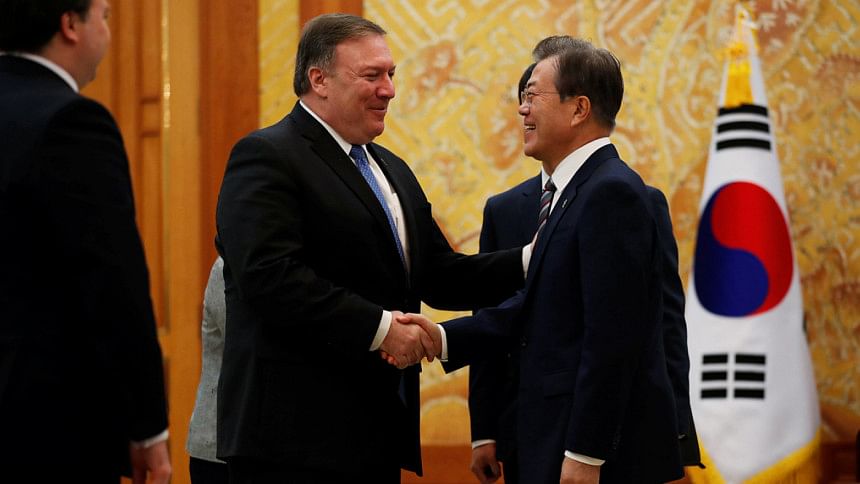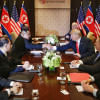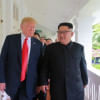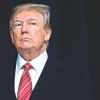World escaped nuclear weapons threat: SKorea president

-- Pompeo says took "very good, significant step" in Singapore
-- NKorea's commitment to denuclearisation "a process, not an easy one," says Pompeo
-- Japan PM seeking summit with NKorea's Kim in Pyongyang
South Korean President Moon Jae-In said today the world had escaped the threat of war after this week's Singapore summit, echoing US President Donald Trump's upbeat assessment of his meeting with North Korean leader Kim Jong Un.
Also read: Summit ended N Korea nuke threat
Trump and Kim issued a joint statement after their historic meeting that reaffirmed the North's commitment to "work toward complete denuclearisation of the Korean Peninsula", an end to joint US-South Korean military exercises and gave US guarantees of security to North Korea.
"There have been many analyses on the outcome of the summit but I think what's most important was that the people of the world, including those in the United States, Japan and Koreans, have all been able to escape the threat of war, nuclear weapons and missiles," Moon told US Secretary of State Mike Pompeo ahead of a meeting between the two in Seoul. The summit statement provided no details on when Pyongyang would give up its nuclear weapons programme or how the dismantling might be verified.
Sceptics of how much the meeting achieved pointed to the North Korean leadership's long-held view that nuclear weapons are a bulwark against what it fears are U.S. plans to overthrow it and unite the Korean peninsula.
"I am confident that we took a very good, significant step in Singapore," Pompeo told Moon on Thursday ahead of a trilateral meeting including Japanese Foreign Minister Taro Kono.
Pompeo insisted after the meeting that Pyongyang was committed to giving up its nuclear arsenal but said it would "be a process, not an easy one".
Kim Jong Un understood getting rid of his nuclear arsenal needed to be done quickly and there would only be relief from stringent U.N. sanctions on North Korea after its "complete denuclearisation", Pompeo said.
"EVERYBODY MUCH SAFER"
The United States has long insisted on complete, verifiable and irreversible denuclearisation by North Korea but, in the summit statement, North Korea committed only to the "complete denuclearisation of the Korean Peninsula", phrasing it has used in the past.
Pompeo said a day earlier he would like to accomplish major nuclear disarmament in North Korea within Trump's current term.
"Absolutely ... you used the term major, major disarmament, something like that? We're hopeful that we can achieve that in the 2-1/2 years," he said.
Pompeo, who is charged by Trump with leading follow-on negotiations, bristled at a question about why the words "verifiable" and "irreversible" were not used in the summit joint statement in the context of denuclearisation.
"It's in the statement. You're just wrong about that ... Because complete encompasses verifiable and irreversible. I suppose you could argue semantics, but let me assure you that it's in the document," Pompeo said on Wednesday.
Trump returned to the United States on Wednesday and took to Twitter to hail the meeting, the first between a sitting US president and a North Korean leader, as a major win for American security.
"Everybody can now feel much safer than the day I took office," Trump tweeted. "There is no longer a nuclear threat from North Korea. Meeting with Kim Jong Un was an interesting and very positive experience. North Korea has great potential for the future!" Democratic critics in the United States said the agreement was short on detail and the Republican president had made too many concessions to Kim, whose country is under UN sanctions for its nuclear and weapons programmes and is widely condemned for human rights abuses.
MAINTAIN THE READINESS
Tokyo has reacted with concern at Trump's plans to cancel military exercises with South Korea, saying such drills are vital for East Asian security.
Two North Korean missiles flew over Japan last year as Pyongyang made rapid advances in its programme to develop a missile capable of striking the US mainland with a nuclear warhead.
Tokyo is working on arranging a meeting between Prime Minister Shinzo Abe and Kim Jong Un, with one possibility including the premier's visit to Pyongyang around August, the Yomiuri newspaper reported.
A government source familiar with the matter told Reuters that Japanese officials planned to discuss the summit meeting with North Korean officials at an international conference on Northeast Asian security to be held in Mongolia on Thursday and Friday.
Despite Trump and Moon's assertions about the North Korean nuclear threat being over, a senior US official responsible for studying the North Korean military said the US intelligence assessment of the nuclear and other military threat posed by North Korea to US and allied forces in Asia and the northwest Pacific remained unchanged.
US officials said it was unclear what types of training involving US and South Korean troops might cross into Trump's now forbidden zone of "war games". But big, joint US-South Korean exercises appeared off-limits under the new guidance.
"Make no mistake, we are going to maintain the readiness of our forces in South Korea," said one US official, speaking on condition of anonymity. The official acknowledged, however, it was still not certain how that was going to happen.
The United States maintains about 28,500 soldiers in South Korea, which remains in a technical state of war with the North after the 1950-53 Korean War ended in a truce rather than a peace treaty.

 For all latest news, follow The Daily Star's Google News channel.
For all latest news, follow The Daily Star's Google News channel. 








Comments